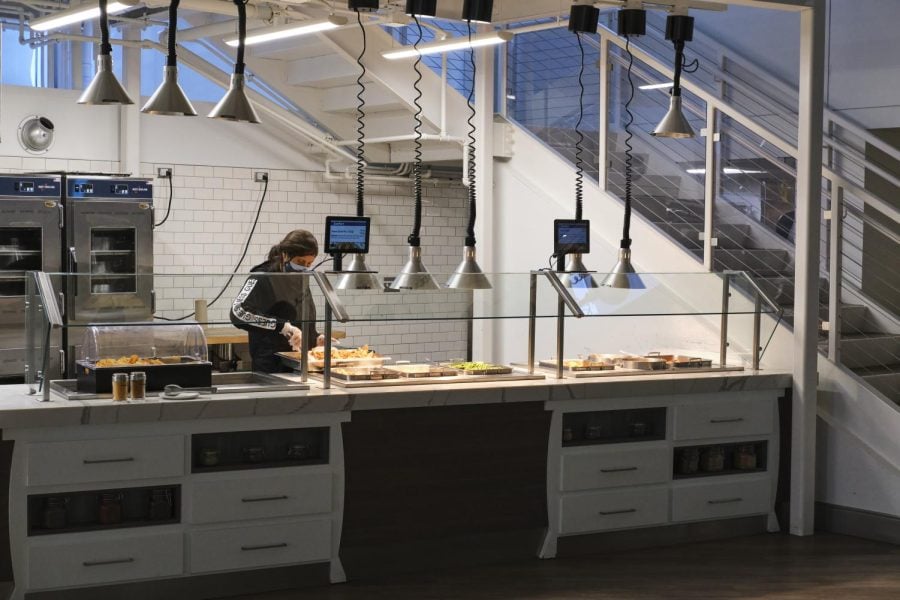Northwestern grapples with high number of open jobs among labor shortages
Daily file photo by Seeger Gray
Allison dining hall. Some dining workers have faced staffing shortages that cause them to work long hours.
April 19, 2022
Despite a strong job market and a low unemployment rate, Northwestern is among the many employers across the country that have faced a unique problem since 2021: they can’t find enough workers.
At University dining halls, concerns about labor shortages aren’t new. In January, Students Organizing for Labor Rights, a coalition of students advocating to improve worker conditions on NU’s campus, cited long lines at food locations as evidence for the need to hire more workers in a guide to students.
“The status quo has not changed significantly,” SOLR organizer and SESP junior Neva Legallet said. “They’re still very short-staffed, using temp workers. They have not done nearly enough.”
Legallet said part of the problem stems from a fundamental issue in the University and Compass Group’s outlook: their focus is to make money, which means minimizing labor costs.
University spokesperson Jon Yates said while the University is experiencing an increase in applications due to job openings, the increase is concurrent with more personnel turnover. In response, NU created a rapid action team to look into issues with worker retention.
“Our priority is not only to fill the openings as quickly as possible, but also to identify why staff are leaving,” Yates said.
Valentina Espinosa, a housekeeper at NU’s James Allen Center through Compass’s FLIK Hospitality Group, said while the shortages aren’t severely affecting her department, others are in need of more assistance.
“There’s one coworker who is a dishwasher who has been asking for help for more than two months because he has been doing the work by himself,” Espinosa said through a translator.
She added because of shortages, workers have to take on the jobs of two or even three people.
Kitanya Robertson, who has worked at the Starbucks in Norris University Center for five years, said she’s struggled with understaffing at her job, especially this year.
“It’s been way worse,” Robertson said. “We’ve been having a hard time keeping employees.”
She said many have left because they’ve felt overworked and underappreciated. With them leaving, those who stay have to pick up the slack.
Last week, Robertson said she had to work with only one other person from 7 a.m. to 2 p.m., when that number should have been three or four. Her break therefore didn’t come until 2 p.m. when it should have been at 11:30 a.m.
While the location is now consistently understaffed according to Robertson, she said an increase in workers could ease the workload.
Compass spokesperson Sophia Bamiatzis said in an email to The Daily despite active efforts to consistently recruit and hire for open positions, the economic environment is making that difficult. The ongoing shortages in the labor pool continue to affect their staffing model and recruitment efforts, Bamiatzis said.
“We advertise our open positions on over 100 websites and regularly hire and onboard new associates throughout the year,” Bamiatzis said in the email. “Over the past six months, we’ve hired 87 new employees.”
Bamiatzis said Compass hires temporary labor for some positions to ensure dining halls operate normally.
Legallet said the use of temporary workers is troubling because it’s a cheaper route and it means overtime pay isn’t necessary for long-time workers.
“They’re not respecting seniority and scheduling,” Legallet said. “(Instead, workers) are being discouraged from taking overtime, even when that would help fill open shifts.”
Espinosa said Compass prefers saving money over offering overtime, especially when that overtime could come on a worker’s seventh-straight day on the job. When that happens, Compass needs to pay them double their hourly wage as outlined in their contracts, she said.
However, Espinosa said she’s also heard of some instances of Compass forcing workers to take overtime even if they don’t want to do so.
“They’re told to file a grievance, face the consequences or do the job,” Espinosa said.
Legallet said she thinks all of this could be avoided if Compass took some steps to pay attention to its workers.
“Obviously the labor market as a whole is seeing some crazy things,” she said. “But I think that on a smaller scale, if Compass listened to workers, to what they need and want at their jobs, to when they’re overworked and stressed, I think that would solve a lot of problems.”
Email: [email protected]
Twitter: @GiangiulioDavis
Related Stories:
— Students urge the University to hire additional dining staff
— Work-study jobs on campus go unfilled, mirroring nationwide labor shortage
— National labor shortage has little effect on some Evanston restaurants, detrimental to others












